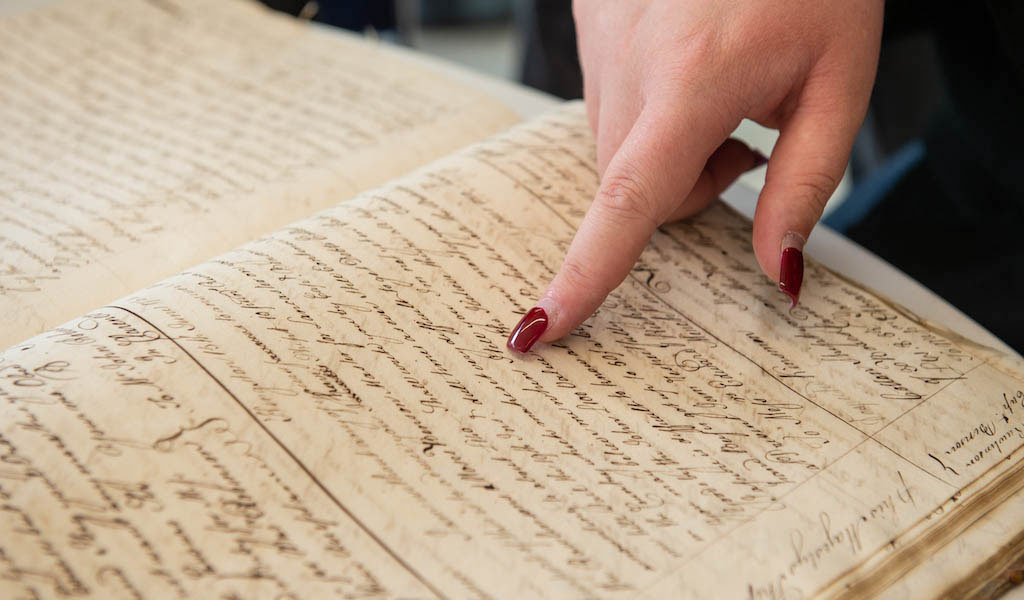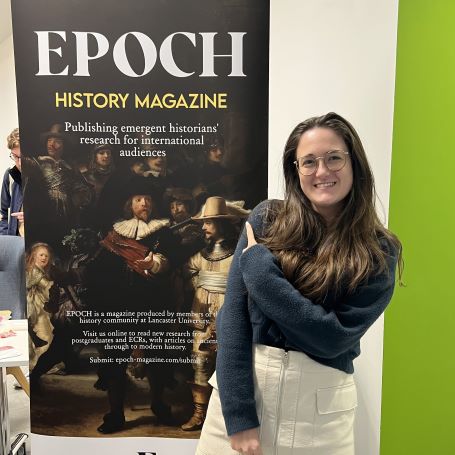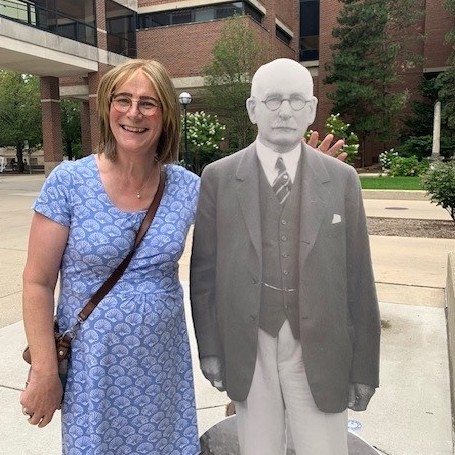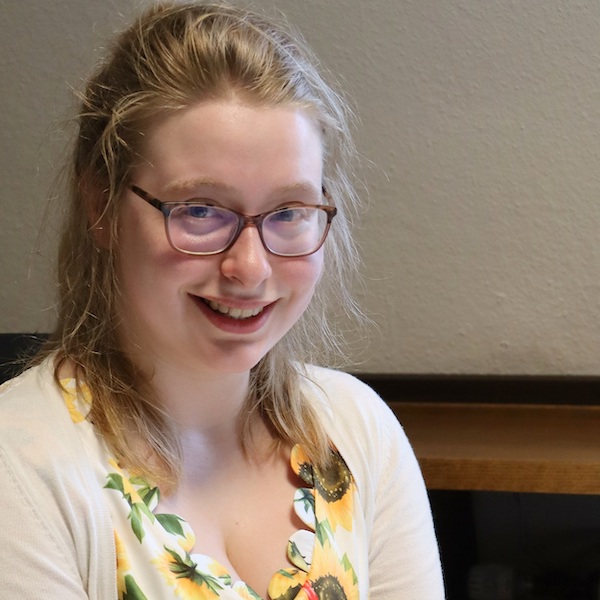History PhD blog
From international conferences and research trips to their first publications, find out what our PhDs having been doing.
From international conferences and research trips to their first publications, find out what our PhDs having been doing.

Back in 2020, in the first year of my PhD, the postgraduate community in the Department had the idea to create a publication for postgraduates to publish their work so that they might reach a wider audience outside of academia. Four years later, EPOCH has published 17 issues, with 270 contributions from academics from 85 institutions across Europe, North America, and Asia. This year alone, EPOCH has had a total unique readership of over 67,000. The magazine has an extraordinary diversity of contributions – representing histories from all time periods, from all around the world.
The inimitable Meredith Guthrie led the way. She both began the conversations and ensured the results. We met with members of the faculty to ask their advice, and then we congregated in Bowland Bar to discuss it. EPOCH began to take shape. Meredith became our first Co-ordinating Editor (CE), and Jacob O’Neill our first Deputy CE. We spent a week or two brainstorming a name. We toyed with ‘Red Rose Review’, but fortunately Rianna Price came up with the name ‘EPOCH’. It was clean, bold, and simple. We loved it.
I took responsibility for the magazine’s visual identity and website. I had some experience with graphic design. Before my undergraduate degree, I did a diploma in Art, Design, and Media, and had a working understanding of the Adobe suite. I did a lot of market research – an excuse really to buy lots of copies of all my favourite magazines like History Today, BBC History Magazine, National Geographic, New Scientist, etc. I mocked up some magazine covers – glossy and colourful – I wanted EPOCH to make academic history look cool.
Then the COVID-19 lockdown hit. EPOCH became the absolute highlight of my week – we met online, on a Thursday at 11 am. The opportunity to be creative and social kept me going. PhD research can be isolating – it’s a solo project, and you spend a lot of time reading and writing, working from home. Yet, the sharing of ideas, of expertise, and skillsets is so exciting – EPOCH was the perfect vehicle for us to bond and work collaboratively when the world felt really lonely.
Our first issue came out in September 2020. We had 18 articles, all edited by the first editorial board. Louis Pulford interviewed historian and broadcaster Nick Barratt (Who Do You Think You Are?). As well as articles from researchers at Lancaster, we had submissions from all over the country and the world including Trinity College Dublin, Aachen University in Germany, and the University of Virginia in the USA.
In the early issues, we were still fine-tuning the process and working out the tone and length of the articles we wanted to publish. Issue 2 came in at over twenty articles, and we started including reviews and short reads. From Issue 3, we began theming the issues which helped us to reach out to people in our network and to better curate the magazine. Karianne Robinson, who took over from Jacob as Deputy CE, was essential in constructing the infrastructure and processes that allowed EPOCH to grow so much. Her work remains at the core of the magazine’s procedures.
These developments also prompted us to reach out to some really exciting people and institutions for cover articles: Meredith interviewed a curator at the Art Institute of Chicago, Sophie Merrix spoke to historian Miranda Kauffman (Black Tudors: The Untold Story, 2017), and most recently Dabeoc Stanley and Anna Drury have interviewed representatives from the Royal Zoological Society of Scotland.
Our early strategy meetings were so exciting – a melting pot of ideas from historians with a great diversity of research topics and academic backgrounds. Different skillsets came together to produce really exciting content and innovative ways of working. For instance, current CE Ed Moore, who works with the digital humanities, took on the enormous task of creating our ‘back of house’ operations, automating the pitch system, and creating a database that has allowed the editorial team to track all the articles and their progress. Ed also built our relationship with the University of Erfurt, Germany, who have contributed many fantastic articles to EPOCH over the past two years.
Sam Hollins, our second CE, and Karianne led us through the Writing Summit (2022) – an event which brought together industry experts, including bestselling author Marc Morris and the University of London Press, to help postgraduates write for wider audiences. Sam also put tireless effort into building our social media following – gaining traction around the world. Dabeoc then took up the CE role. Under his leadership, EPOCH’s readership grew substantially. He championed interdisciplinary research, paving the way for relationships with other universities and institutions. EPOCH continued to expand and grow under the leadership of the most recent CE, Will Garbett. Will did an exceptional job raising EPOCH's profile, building connections, and ensuring the high quality of the publication. Will was also published in EPOCH’s very first issue, during his MA year.
All of the magazine’s articles are available on the website and showcase the incredible work being done by PhD researchers in history, and history-adjacent disciplines, around the world. Our catalogue also showcases much of the talent here at Lancaster. EPOCH’s most-read piece to date is Alex Rome Griffin’s review: ‘Ancient Apocalypse Isn’t Just Wrong It's Sinister’. Jude Rowley, who joined us from International Relations, has written superb – and internationally received – articles about Lancaster’s own history. Ben Wills-Eve’s piece on history and AI, Lina Andreeva’s piece on the Great Fire of London, Laura Noller’s on the Nazi Occupation of the Channel Islands, and Johanne-Marie Skov’s on the Falkland Islands all stand as examples of exceptional scholarship emerging from the Lancaster PhD community.
EPOCH has been, and continues to be, a fantastic way for PhD students to work together, to network, and to build experience and skills that will serve them both in academia and beyond. It has also supported, and been supported by, the other PG initiatives in the department, namely LHPC and PG Seminar, and has benefitted from the tireless work of those, like Amy Stanning, who have maintained these initiatives over the years. For many of our editors, work in EPOCH has led to further opportunities, consulting jobs, and articles in other publications. I don’t expect I will pursue an academic career, but through EPOCH I have built a portfolio that has kept me employed throughout my doctoral studies. I am now starting a job with History Today.
I am sad to leave the EPOCH board, but so proud of what we achieved together. The magazine has achieved, and surpassed, all that Meredith and the founding team hoped it could. I hope it continues to serve postgraduates for years to come.

I was incredibly fortunate to spend four weeks in Summer 2023 in Ann Arbor, Michigan working in the William L. Clements Library. The library has an extensive collection of unique archival material relating to the United States in the eighteenth and nineteenth centuries.
My NWSSDTP funded PhD project is addressing the question, ‘Was there a Taxation Revolution in late eighteenth-century Britain?’ So why would I need to research papers at the Clements Library?
The Clements Library is home to the archive papers of William Petty, 1st Marquis of Lansdowne, 2nd Earl of Shelburne, who was British Prime Minister between 1782 and 1783. Shelburne’s papers are of great interest to researchers as his period in office coincided with the end of the American War of Independence (1775–1783), and as he began the peace treaty negotiations.
The War was ruinously expensive for Britain with huge amounts of expensive debt borrowed to finance the military. One of the many issues Shelburne’s Government had to deal with was stabilising the public finances by raising taxation to pay off the debt. I needed to find out which options they considered and why took the decisions they did. Over four weeks at the library I took pictures of over 1500 documents!
Ann Arbor is a small town, dominated by the university. I arrived in their arrivals week and the place was buzzing with excitement in 30-degree temperatures and gorgeous blue skies. I had secured ‘visiting scholar’ status at the university and so was able to use their amazing facilities, hang out in the History Department and meet other PhD students. I loved being invited to a barbeque, lectures and a film screening. I was even introduced to the entire faculty as a visiting scholar from England! I had researched which staff shared my interests and arranged several one-to-one meetings, being treated to lunch and drinks along the way! Being a registered student even gave me free bus fares for the whole trip!
My weekdays were spent in the archive; the staff were welcoming and friendly and really keen to help with my work. I found some wonderful documents including private correspondence showing the inner workings of government, surprising schemes to re-organise taxes which have big implications for my research and even complete newspapers which included reports on events I had discovered in my work at the British Library!
It wasn’t all work though, the library was closed at the weekends, so I visited Ann Arbor’s impressive museums, for art, archaeology and natural history. I discovered charming historic areas with tempting antique and clothes shops and wonderful restaurants. Although public transport in the area did not extend much beyond the town itself, I did take the coach to Detroit for a fascinating visit and made it briefly over the border to Windsor in Canada – an experience in itself, and with wonderful views of Detroit City over the Detroit River.
The material I found at the Clements prompted new thinking on my project and this, supported by the material I discovered has become the foundation for a chapter of my thesis and a research paper which has been given at three conferences.

In June of 2024, I travelled to four archives across Germany in pursuit of German-language primary source material for my thesis project. Throughout the ten-day trip, I found myself turning over one question in my brain: how on earth did I get here?
I have never been a particularly adventurous person. I chose to attend Lancaster University for my undergraduate degree largely because it was the best History Department within commutable distance from my home. I was convinced I would live the rest of my life within Lancashire’s borders, occasionally venturing north of the Scottish border on holiday every other year. That was until I was assigned Professor Marco Wyss as my undergraduate dissertation supervisor. Through his mentorship, alongside that of Professor Corinna Peniston-Bird, I was successful in my application for funding from the Economic and Social Research Council, who sponsored me throughout my MA degree here at Lancaster and will continue to do so throughout my PhD research.
My MA research built on the work I conducted during my undergraduate dissertation, which explored Jewish identity in the Channel Islands during their occupation by Nazi forces between 1940 and 1945. I was honoured to receive two prizes for my MA research, the Queen’s Scholarship and the Iredell Prize for outstanding academic performance in History. I am so proud of this research, which shed light on the interactions between soldiers and civilians within this unique occupation context. However, I knew that as I expanded the scope of this research for my PhD thesis, which examines the many and varied perspectives of different groups present on the islands during occupation, I needed more of the previously neglected German perspective. In a field where the histories are written almost exclusively from a British point of view, it was important to me to highlight the experiences of the thousands of German troops, nurses, and authorities stationed on the islands.
So, I found myself touching down on German soil, feeling incredibly grateful to the Economic and Social Research Council (ESRC) and my two incredible supervisors for enabling me to take hold of this opportunity with both hands.
Of the four archives I visited whilst in Germany, two provided the bulk of the most exciting material. One of these was the Deutsches Tagebucharchiv (DTA) in Emmendingen, a tiny archive which took up only half of the two upper floors of a traditional town hall building. Frau Jäger-Schenk, the DTA’s research associate, welcomed me into a cramped reading room, its walls stacked with bound copies of diaries and memoirs, with a warm smile which did not leave her face for the duration of my visit. There, I discovered the largest known collection of letters from a soldier on the Channel Islands, along with a fascinating set of memoirs.
The other stand-out archive was the Bundesarchiv Militärarchiv, a contrast to the warm yellow paint of the DTA with its prison-like exterior. The staff’s kindness contrasted the barbed wire and concrete posts. After having my photo ID inspected, I was waved through the gate and instantly became hopelessly lost, eventually being forced to recruit a lovely but long-suffering vending machine repairman to lead me through the maze of corridors to the reading room. Yet, my quest was worth it when I was sat down before a thick red scrapbook. Held in the hands of a German woman eighty years before, the diarist’s words, press cuttings, and photographs painted the familiar landscape of the Channel Islands as she and her husband visited the troops stationed there on a morale-boosting tour in the early years of the occupation. I had hit the jackpot.
A few weeks after my return home, I was on a Zoom call with an expert on the diary from the University of Miami, excitedly planning my next steps.

In April this year, I was incredibly fortunate to spend just over a week in Honolulu, Hawaii, both attending and presenting a paper at the 2024 American Association of Geographers (AAG) Annual Meeting.
This once-in-a-lifetime trip came about when I spotted a call for papers from Maria Jesus Alfaro-Simmonds (University of Huddersfield) and Natan Waintrub (Center for Sustainable Urban Development, Pontificia Universidad Católica de Chile). Together, they were organising the session ‘Being Vulnerable in Latin American Cities’, to feature at AAG 2024, and they were seeking papers to feature in their session. I was instantly keen to submit an abstract to Maria and Natan, given how well suited my thesis project was to their session and its themes, most notably the current and historical challenges that shape dynamics of urban (ex)inclusion in Latin America.
My thesis project ‘Putafeminismo: Sex Work, Stigma, and Afterlives of Sexual Slavery in Brazil’ historicises the estigma (stigma) attached to sex work, and to the subjects who perform it, through the philosophies of Brazilian putafeminismo: a modern-day feminism created by sex worker activists across Lusophone and Hispanic cultures. Puta (‘whore’) is most commonly used as a derogatory term to stigmatise especially feminine subjects. Brazilian putafeministas unite two feminine subject positions imagined as being opposed to one another in an effort to refuse the estigma inherently associated with sex work, which has particular resonances in the Brazilian historical context. I propose that studying the conflation of estigma with both sexual slavery and modern-day sex work in Brazil can illuminate the nation’s gendered afterlives of slavery.
Within my abstract, I highlighted how the current and historical challenges that shape dynamics of urban (ex)inclusion in Latin America could be critically addressed, through an exploration of Brazilian putafeminismo. I discussed some of the racialised, gendered, and sexualised spaces in Brazil, in which sex workers are regarded as a stigmatised population, and how this informs our understanding of what it means to be vulnerable in Latin American cities. I also signalled to some of the strategies and practices being adopted by Brazilian putafeministas who are involved in shaping current cities, most notably Rio de Janeiro, through countering their vulnerability as urban actors and demanding place within urban spaces as equal, unstigmatised, legitimate citizens.
When the email came through saying my paper had been accepted, I was over the moon! Three flights, two oceans, and one overnight layover later, I arrived at Daniel K. Inouye International Airport in Honolulu. Honolulu is located on the island O‘ahu, one of the eight main Hawaiian Islands. With breath-taking scenery and gorgeous weather, it was a very special location for the conference to take place. Nearly 3,800 people from various disciplinary backgrounds gathered at the Hawaii Convention Center for the AAG Annual Meeting! I attended a wide variety of sessions, from ‘Material Culture and Geography’ to ‘Queer Inconveniences: Tensions in Sexualities and Gender Research, Politics, and Communities’. My paper was really well received, and I thoroughly enjoyed the discussion segment with my fellow speakers and members of the audience. I forged some wonderful connections with PhDs and ECRs from around the world, two of whom I have since had a Zoom call with to discuss possible future collaborative projects!
On the whole, the experience of attending my first international academic conference was awesome. As a historian, I found that through participating in an interdisciplinary conference like AAG 2024, I was able to have some of the most fruitful discussions related to my thesis project to date.

